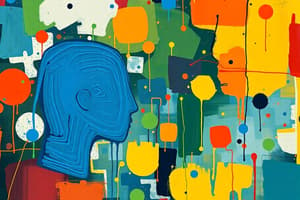Podcast
Questions and Answers
What is human capital, in terms of an organization?
What is human capital, in terms of an organization?
Human capital encompasses the intangible qualities that employees bring to an organization, such as skills, knowledge, and experience, that contribute to its success.
Explain the main idea of human capital theory.
Explain the main idea of human capital theory.
Human capital theory proposes that investments in people, like education and training, are quantifiable and beneficial for employees, employers, and society as a whole, leading to economic growth.
How does the standard approach in labor economics view human capital?
How does the standard approach in labor economics view human capital?
Labor economics views human capital as a set of skills and characteristics that enhance a worker's productivity.
What is the significance of human capital in the post-industrial economy?
What is the significance of human capital in the post-industrial economy?
How did human capital theory evolve within the context of economic theories?
How did human capital theory evolve within the context of economic theories?
Explain how human capital contributes to economic growth.
Explain how human capital contributes to economic growth.
How does human capital differ from traditional economic factors like land and capital?
How does human capital differ from traditional economic factors like land and capital?
Give an example of how human capital can be developed.
Give an example of how human capital can be developed.
Explain why "knowledge" is considered a form of human capital. Include specific examples of how knowledge can increase earnings or improve productivity.
Explain why "knowledge" is considered a form of human capital. Include specific examples of how knowledge can increase earnings or improve productivity.
What are some other examples of investments in human capital besides education and training? Explain how these examples contribute to the development of human capital.
What are some other examples of investments in human capital besides education and training? Explain how these examples contribute to the development of human capital.
Describe the key characteristics of human capital that distinguish it from traditional forms of capital like physical assets? Why is human capital considered 'intangible capital'?
Describe the key characteristics of human capital that distinguish it from traditional forms of capital like physical assets? Why is human capital considered 'intangible capital'?
Imagine you are trying to explain the concept of human capital to someone who has never heard of it before. Explain in simple terms what human capital is, using an example that is easy to understand.
Imagine you are trying to explain the concept of human capital to someone who has never heard of it before. Explain in simple terms what human capital is, using an example that is easy to understand.
Why do economists consider investments in education, training, and healthcare to be investments in human capital? Explain your answer using the term ‘return on investment’ as it relates to human capital.
Why do economists consider investments in education, training, and healthcare to be investments in human capital? Explain your answer using the term ‘return on investment’ as it relates to human capital.
What is the central argument made by Karl Marx about human capital in contrast to the views of Adam Smith and other earlier economists?
What is the central argument made by Karl Marx about human capital in contrast to the views of Adam Smith and other earlier economists?
According to the Becker View, what is the nature of human capital and how does it impact productivity?
According to the Becker View, what is the nature of human capital and how does it impact productivity?
How does the Gardener View differ from the Becker View on the nature of human capital?
How does the Gardener View differ from the Becker View on the nature of human capital?
What is the primary focus of the Schultz/Nelson-Phelps View on human capital?
What is the primary focus of the Schultz/Nelson-Phelps View on human capital?
How did Adam Smith conceptualize human capital?
How did Adam Smith conceptualize human capital?
What is a key difference between Adam Smith's and Karl Marx's views on human capital?
What is a key difference between Adam Smith's and Karl Marx's views on human capital?
What two 'disagreeably frustrating facts' about human capital theory did Marx highlight?
What two 'disagreeably frustrating facts' about human capital theory did Marx highlight?
Describe the Schultz/Nelson-Phelps View on the role of human capital in adapting to changing environments.
Describe the Schultz/Nelson-Phelps View on the role of human capital in adapting to changing environments.
Flashcards
Human Capital
Human Capital
The knowledge, skills, competencies, and attributes individuals possess that contribute to economic production.
Investments in Human Capital
Investments in Human Capital
Expenditures on education, training, and healthcare viewed as investments that enhance individual capabilities.
Intangible Qualities
Intangible Qualities
Non-physical attributes such as knowledge, values, and skills that contribute to human capital.
Economic Production
Economic Production
Signup and view all the flashcards
OECD Definition of Human Capital
OECD Definition of Human Capital
Signup and view all the flashcards
Human Capital Theory (Adam Smith)
Human Capital Theory (Adam Smith)
Signup and view all the flashcards
Labor Power (Karl Marx)
Labor Power (Karl Marx)
Signup and view all the flashcards
Marx's Frustrating Facts
Marx's Frustrating Facts
Signup and view all the flashcards
Becker View of Human Capital
Becker View of Human Capital
Signup and view all the flashcards
Gardener View of Human Capital
Gardener View of Human Capital
Signup and view all the flashcards
Adaptability in Human Capital
Adaptability in Human Capital
Signup and view all the flashcards
Production Function
Production Function
Signup and view all the flashcards
Multiple Intelligences
Multiple Intelligences
Signup and view all the flashcards
Human Capital Theory
Human Capital Theory
Signup and view all the flashcards
Economic Growth
Economic Growth
Signup and view all the flashcards
Post-Industrial Economy
Post-Industrial Economy
Signup and view all the flashcards
Skills and Characteristics
Skills and Characteristics
Signup and view all the flashcards
Labor Economics
Labor Economics
Signup and view all the flashcards
New Classical Theory
New Classical Theory
Signup and view all the flashcards
Human Intellectual Potential
Human Intellectual Potential
Signup and view all the flashcards
Study Notes
Human Capital (Concept and Theory)
- Human capital is more than just physical labor.
- It encompasses a wide range of intangible qualities that contribute to organizational success.
- Human capital includes workers' knowledge, skills, competencies, and other attributes.
- The accumulation of knowledge and skills directly influences productivity and income.
- These attributes, acquired over a lifetime, are essential for creating goods, services, and ideas.
Different Perspectives on Human Capital
- Traditional approach (Personnel): Focuses on position, staffing, and knowledge/compliance.
- Current approach (Human Resources): Focuses on people, satisfaction, and skills/career development.
- Evolving approach (Talent Development): Focuses on human capital, sustainability, and organizational/competencies development.
- New approach (Human Capital): Integrates all aspects of the previous approaches into a holistic view.
The Total Value of a Business
- A business's total value comprises both tangible and intangible sources.
- Tangible sources include money and physical assets.
- Intangible sources include intellectual capital, specifically human capital, social capital, and organizational capital.
Intangible Capital
- This involves schooling, computer training, medical care, and demonstrating virtues like punctuality and honesty.
- These activities increase earnings, improve health, and create good habits, thus enhancing a person's overall value
Theory of Human Capital
- Investing in education, training, and healthcare is crucial for developing human capital.
- Economists consider these investments as investments in human capital.
- Human capital is unique as it cannot be separated from the individual's knowledge, skills, health and values.
Student's Human Capital Values
- Students should list at least five values they deem important, including knowledge, skills, and work ethic.
Human Capital in Economics
- Human capital extends beyond physical labor and encapsulates intangible qualities impacting organizational success.
- Measuring investments in human capital can quantify value for individuals, organizations, and society, leading to economic growth.
Theories of Human Capital
- Becker View: Human capital is useful in direct production, increasing worker productivity.
- Gardener View: Multiple dimensions/types of skills exist in a worker, including mental and physical abilities. Human capital is not unidimensional.
- Schultz/Nelson-Phelps View: Focuses on human capital's adaptability to changing environments (disequilibrium).
- Bowles-Gintis View: Emphasizes adaptation to hierarchical societies, with an emphasis on ideology instilled through education.
- Spence View: Observable measures of human capital are essentially signals of underlying ability rather than direct contributions to production.
HC (Human Capital) is Unique
- A statement emphasizing the unique aspects of human capital.
Studying That Suits You
Use AI to generate personalized quizzes and flashcards to suit your learning preferences.



